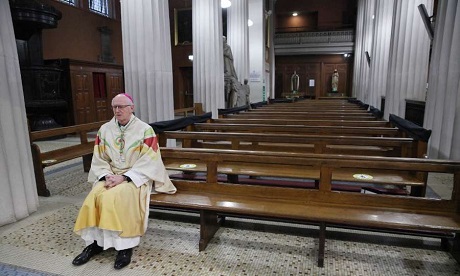Evidence of Christian belief has vanished in Ireland today, says Catholic Archbishop of Dublin Dermot Farrell.
He says younger generations are most acutely suffering from the underlying crisis of faith.
Farrell (pictured) blames media in part for this, saying “Public commentary in the media in Ireland has not been positive in its understanding of the Church and its need for vocations, and for public support of those trying to preach the Gospel.
“The challenges facing me are pretty clear. We have an ageing clergy and very few vocations to the diocesan priesthood or religious life. There is a major decline in the number of people who actively practice and live their faith.”
The archbishop says being openly, actively involved in practising the Faith is essential – but this isn’t happening.
“Faith needs ritual, embodiment. One must see in people how faith is lived. Today the visibility of faith has for all intents and purposes vanished. I am also dealing with the legacy of sexual abuse scandals which have damaged the Church’s credibility. Since finance is a function of numbers, financial issues will arise which will be accelerated by the global pandemic and its aftermath.”
In Farrell’s opinion, the current model of the Church is unsustainable. Nonetheless, he has not given up on trying and had a number of ideas to help the Church regenerate.
He says Dublin needs “an effective programme of catechetics throughout the diocese to add to and, eventually, replace the current teaching of faith to the young.
“With the gradual decline of family socialisation in religion, the role of the qualified catechist will be essential. In my opinion, the handing on of the Faith to the young is one of the most serious challenges facing our Church today.”
For Christian belief to thrive, bishops and priests have “to encourage a participatory institutional model of Church with a leadership of service,” Farrell says. Central to this model “is the People of God, who comprise 99.99 percent of the Church’s members. When this is grasped all else changes,” he says.
Despite his concerns, Farrell says he is “not pessimistic about the future of the Church in Dublin.
“When young people volunteer to look after the sick, or the elderly, or the poor, when accompanied, it may facilitate a dynamic where the Lord starts to speak and move the heart of the young person. We need to start here rather than telling people to go to Mass.
“This time of reduced numbers may well afford us an opportunity to be creative and to re-imagine the institutional Church. We have not been abandoned by God. God is to be found in this situation,” he concludes.
Source
